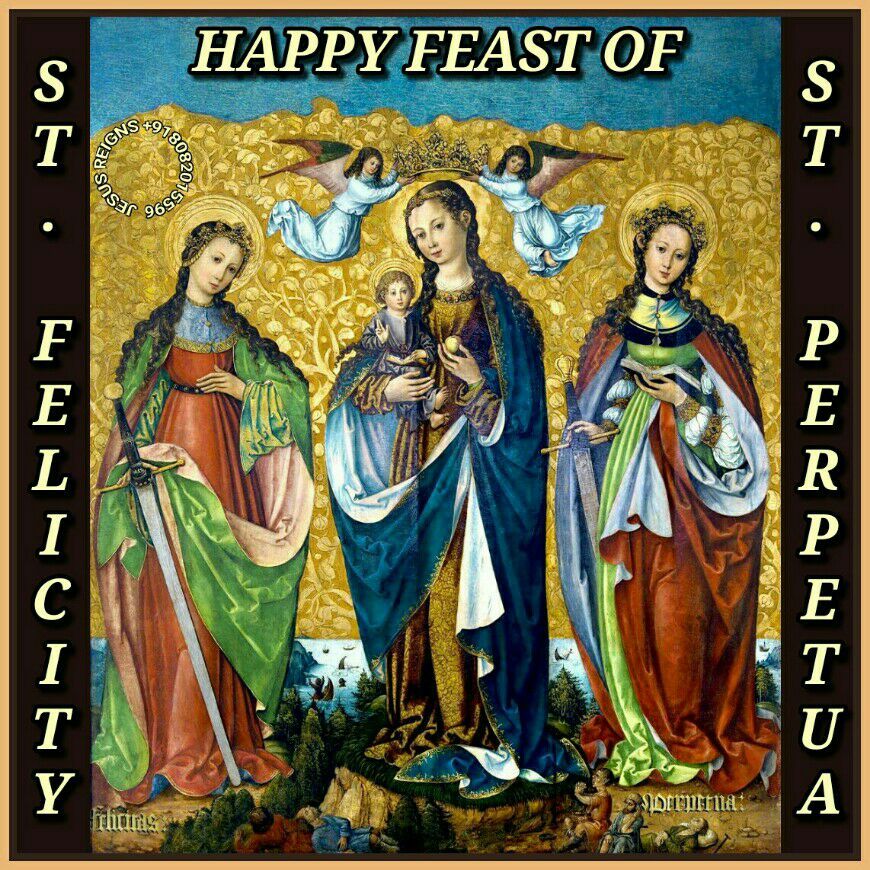SAINTS OF THE DAY
THURSDAY, 7 MARCH, 2024
SAINTS PERPETUA AND FELICITY
MARTYRS
(Late 2nd Century - 203 A.D)
Many centuries ago, in the desert lands of North Africa now populated by tens of millions of adherents of Islam, there was once a thriving Catholic Church. Dioceses, bishops, theologians, shrines, cemeteries, schools, monasteries, convents, and saints filled the towns hugging the southern coast of the Mediterranean Sea. This vibrant Catholicism gave birth to, and was inspired by, the witness of numerous martyrs. Many of their names are known, among them today's saints, Felicity and Perpetua. Few documents in Church history can match the raw power of the first person, eye-witness account of the assassination of Perpetua and Felicity. It is a gripping narrative filled with breathtaking dramatic detail. The reader can almost feel the hot sand of the arena warming his feet, a gentle sea breeze caressing his cheeks, and the sweaty crowd pressing against him, their roar for bloodlust echoing through the dry air.
Vivia Perpetua, twenty-two years old, was married, a noblewoman, and a new mother whose baby was still nursing. Her pagan father begged his favorite daughter to renounce her Christian faith, but to no avail. Felicity was a slave and pregnant when jailed. She gave birth a few days before her martyrdom. Her child would be raised by Christian women in Carthage. Perpetua, in her own hand, recorded the events leading up to her martyrdom, while an eye-witness to her death completed the text later. When they were first thrown into the arena, Perpetua and Felicity were attacked by a rabid heifer, which was chosen because it shared the same sex as its victims. The young women were grievously injured by the mad cow and then momentarily removed from the arena until gladiators were brought in to conclude the day's spectacle. The executioners carried out their duties quickly, though Perpetua had to guide the gladiator's sword to her throat after he first painfully struck a bone instead of a vein. As the narration states, “Perhaps such a woman…could not die unless she herself had willed it.” Perpetua and Felicity were imprisoned together, suffered together, and died together in 203 A.D. in Carthage, North Africa, along with other noble martyrs whose names are preserved in the same account.
The vivid description of their deaths was so moving that it was faithfully preserved down through the centuries and has come to us largely intact. Apart from the New Testament writings themselves, only a few documents from the early Church pre-date the passion narrative of Perpetua and Felicity. It invites tantalizing reflection on how many similar first hand testimonies of famous martyrdoms from the early Church have been lost! What could have been known about the final moments of Saints Paul, Cecilia, Irenaeus, and so many apostles and popes! The accounts of Perpetua, Felicity, and Polycarp must fire our imagination for all the rest. The Church in North Africa so often read the account of Perpetua and Felicity in its public liturgies that Saint Augustine, a North African bishop living two hundred years after their martyrdoms, had to remind his faithful that the narrative was not on a par with Scripture itself.
PATRON: Perpetua — Cattle, death of children, martyrs and Felicity — Death of children; martyrs; sterility; to have male children; widows.
SYMBOLS: Perpetua — Wild cow; spiked ladder guarded by a dragon and Felicity — Seven swords; cauldron of oil and sword; sword with seven heads; eight palms.
PRAYER: O God, at the urging of whose love the Martyrs Saints Perpetua and Felicity defied their persecutors and overcame the torment of earth, grant, we ask, by their prayers, that we may ever grow in your love. Through our Lord Jesus Christ, your Son, who lives and reigns with you in the unity of the Holy Spirit, one God, for ever and ever. Amen.
